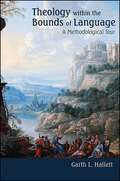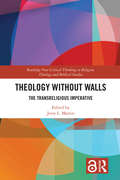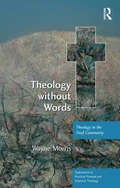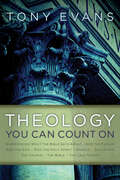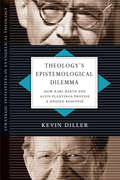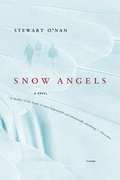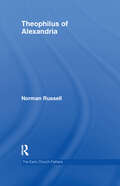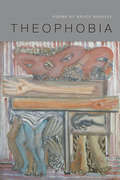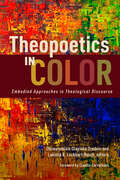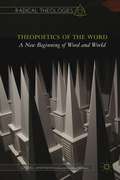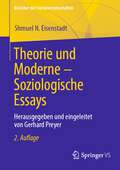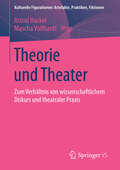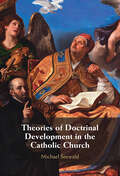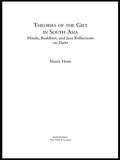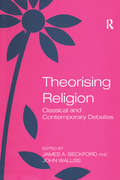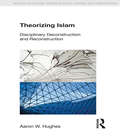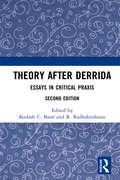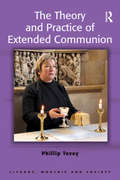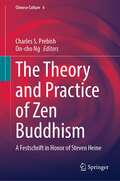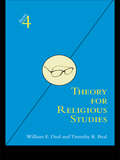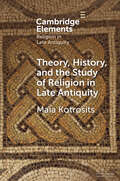- Table View
- List View
Theology within the Bounds of Language: A Methodological Tour
by Garth L. HallettIn this wide-ranging work, Garth L. Hallett offers a guided tour through fundamental issues regarding the use of language in theology. His preliminary discussions—on language and thought, language and truth, the authority of language, making sense, the relationship between sense and possibility—prepare linguistic reflection on such topics as inference and argument, universal factual and moral claims, defining and saying what things are, verbal versus nonverbal agreement and disagreement, interfaith dialogue, theological language, and metaphor. Hallett employs a wealth of distinctly Christian examples in these considerations, including love, faith, God, religion, the Eucharist, the afterlife, divine law, evil, the Incarnation, the Trinity, the holy, and many others. In the course of this fascinating exploration, readers should learn to find their way more surely in a vast, complex terrain, and mystery will emerge both diminished and deepened. In addition, at the end of each chapter Hallett provides a series of intriguing quotations that invite further reflection.
Theology Without Walls: The Transreligious Imperative (Routledge New Critical Thinking in Religion, Theology and Biblical Studies)
by Jerry L. MartinThinking about ultimate reality is becoming increasingly transreligious. This transreligious turn follows inevitably from the discovery of divine truths in multiple traditions. Global communications bring the full range of religious ideas and practices to anyone with access to the internet. Moreover, the growth of the "nones" and those who describe themselves as "spiritual but not religious" creates a pressing need for theological thinking not bound by prescribed doctrines and fixed rituals. This book responds to this vital need. The chapters in this volume each examine the claim that if the aim of theology is to know and articulate all we can about the divine reality, and if revelations, enlightenments, and insights into that reality are not limited to a single tradition, then what is called for is a theology without confessional restrictions. In other words, a Theology Without Walls. To ground the project in examples, the volume provides emerging models of transreligious inquiry. It also includes sympathetic critics who raise valid concerns that such a theology must face. This is a book that will be of urgent interest to theologians, religious studies scholars, and philosophers of religion. It will be especially suitable for those interested in comparative theology, inter-religious and interfaith understanding, new trends in constructive theology, normative religious studies, and global philosophy of religion.
Theology without Words: Theology in the Deaf Community (Explorations in Practical, Pastoral and Empirical Theology)
by Wayne MorrisThis book is a study of a Christian theology without words, focussing on theology in the Deaf Community. Deaf people's first and preferred method of communication is not English or any other spoken language, but British Sign Language - a language that cannot be written down. Deaf people of faith attend church on a regular basis, profess faith in God and have developed unique approaches to doing theology. While most Western theology is word-centred and is either expressed through or dependent on written texts, theology in the Deaf Community is largely non-written. This book presents and examines some of that theology from the Deaf Community and argues that written texts are not necessary for creative theological debate, a deep spirituality or for ideas about God to develop.
Theology You Can Count On: Experiencing What the Bible Says About... God the Father, God the Son, God the Holy Spirit, Angels, Salvation...
by Tony Evans"For many people the word theology suggests seminary-educated scholars who sit in ivory towers, isolated from the real world, studying the Bible. Such study is often viewed as esoteric and unrelated to the world where men and women live, work, play, raise families, and struggle with the realities of day-to-day life.Nothing could be further from the truth." ---Tony EvansWhat we think about God, also known as theology, influences what we believe, do, and say. And what we think, whether true or false, makes a big difference in real life.Tony Evans wants you to know the truth about God, so Theology You Can Count On communicates truths about God in language you can understand. He walks through what the Bible teaches, topic by topic, truth by truth. The great thing is, these truths aren't reserved for people with PhDs. They're for real life. They're for you.
Theology You Can Count On: Experiencing What the Bible Says About... God the Father, God the Son, God the Holy Spirit, Angels, Salvation...
by Tony Evans"For many people the word theology suggests seminary-educated scholars who sit in ivory towers, isolated from the real world, studying the Bible. Such study is often viewed as esoteric and unrelated to the world where men and women live, work, play, raise families, and struggle with the realities of day-to-day life.Nothing could be further from the truth." ---Tony EvansWhat we think about God, also known as theology, influences what we believe, do, and say. And what we think, whether true or false, makes a big difference in real life.Tony Evans wants you to know the truth about God, so Theology You Can Count On communicates truths about God in language you can understand. He walks through what the Bible teaches, topic by topic, truth by truth. The great thing is, these truths aren't reserved for people with PhDs. They're for real life. They're for you.
Theologygrams: Theology Explained in Diagrams
by Rich WyldRich Wyld is the author behind the popular Theologygrams blog, and here he has collected a selection of diagrams—in full color—that will appeal to the theologian and the non-specialist reader alike. Clever, cheeky, and genuinely instructive, this little book will be appreciated by anyone who doesn’t take too seriously our human efforts to explain the things of faith. Moving from the Old Testament to the New, covering historical figures and modern-day questions about the Bible, Theologygrams provides an amusing, intelligent, and visual way of thinking about theology. Laugh along as Wyld captures the reality of church life and makes theological truths accessible in a way you’ve never seen before.
Theology's Epistemological Dilemma: How Karl Barth and Alvin Plantinga Provide a Unified Response (Strategic Initiatives in Evangelical Theology)
by Kevin DillertruthTheology's Epistemological Dilemma
Theophilos: A Novel
by Michael O'Brien"St. Luke addressed his Gospel and the Acts of the Apostles to a man named Theophilos. Who was Theophilos? Scripture scholars do not know, making him a fit subject for Michael O'Brien's vivid imagination. In this fictional narrative, Theophilos is the skeptical but beloved adoptive father of St. Luke. Challenged by the startling account of the 'Christos' received in the chronicle from his beloved son Luke, and concerned for the newly zealous young man's fate, Theophilos, a Greek physician and an agnostic, embarks on a search for Luke to bring him home. He is gravely concerned about the 'illusions ' to which Luke has succumbed regarding the incredible stories surrounding Jesus of Nazareth, a man who has caused so much controversy throughout the Roman Empire. Thus begins a long journey that will take Theophilos deep into the war between nations and empires, truth and myth, good and evil, and into unexpected dimensions of his very self. His quest takes the reader into three ancient civilizations--Greek, Roman, Jewish--as well as into early Christianity, where he meets those who knew this man that some believe is the Messiah. Though Theophilos is a man of the past ages, he is as familiar to us as the men of our own times. Schooled in the empiricism of both medicine and philosophy, Theophilos is well suited to speak to our age in which seeing cannot be the basis for faith, but rather hearing the witness of those who have been touched by God and opening ourselves to the possibility of an encounter with the living Christ. This is a story about the mysterious interaction of faith and reason, the psychology of perception, and the power of love over death."
Theophilus of Alexandria (The Early Church Fathers)
by Norman RussellIf Theophilus of Alexandria seems a minor figure today, it is because we persist in seeing him through the eyes of hostile contemporary witnesses, each of whom had his own reasons for diminishing Theophilus’ stature. In fact, he was one of the greatest bishops of the Theodosian era, who played an important role in a crucial phase of the Roman Empire’s transformation into a Christian society. Norman Russell's new assessment of Theophilus shows him as an able theologian, an expert ecclesiastical lawyer, a highly skilled orator and, surprisingly, a spiritual teacher. The introductory section examines his efforts to Christianize an Egypt still denominated by its great temples and his battles to maintain the pre-eminence of the Alexandrian Church in an age of rapid change. The texts, most of them translated into a modern language for the first time, reveal the full power and range of his thinking. Thoephilus of Alexandria brings back into focus a figure who has long been neglected in the study of early Christianity and will provide students and lecturers with a fresh perspective, not least through the translation of texts, for the first time, into English.
Theophobia (American Poets Continuum #136.00)
by Bruce BeasleyTheophobia is the latest volume in Bruce Beasley's ongoing spiritual meditation which forms a kind of postmodern devotional poetry in a reinvention of the tradition of John Donne, George Herbert, Emily Dickinson, Gerard Manley Hopkins, and T. S. Eliot. Theophobia is structured around a series of poems called "Pilgrim's Deviations" and forms a deviant and deviating pilgrimage through science, history, politics, and popular culture. Beasley seeks the Biblical Kingdom of God among Dolly the cloned sheep, the wonders and horrors of extremophilic creatures living in astonishing intensities of temperature, robotic phone operators, and Wikipedia's explanation of the mysteries of the Holy Spirit. Bruce Beasley is the author of six poetry collections, most recently The Corpse Flower: New and Selected Poems (University of Washington Press, 2007). He has won fellowships from the NEA and the Artist Trust of Washington and three Pushcart Prizes.
Theophobia
by Bruce BeasleyTheophobia is the latest volume in Bruce Beasley's ongoing spiritual meditation which forms a kind of postmodern devotional poetry in a reinvention of the tradition of John Donne, George Herbert, Emily Dickinson, Gerard Manley Hopkins, and T. S. Eliot. Theophobia is structured around a series of poems called "Pilgrim's Deviations" and forms a deviant and deviating pilgrimage through science, history, politics, and popular culture. Beasley seeks the Biblical Kingdom of God among Dolly the cloned sheep, the wonders and horrors of extremophilic creatures living in astonishing intensities of temperature, robotic phone operators, and Wikipedia's explanation of the mysteries of the Holy Spirit. Bruce Beasley is the author of six poetry collections, most recently The Corpse Flower: New and Selected Poems (University of Washington Press, 2007). He has won fellowships from the NEA and the Artist Trust of Washington and three Pushcart Prizes.
Theopoetics in Color: Embodied Approaches in Theological Discourse
by Oluwatomisin Olayinka Oredein and Lakisha R. Lockhart-RuschA collaborative book project centering the liberative theopoetics practiced by a new generation of scholars of color What is theopoetics? Once a field dominated by white liberals in the ivory tower, this embodied form of theology has flourished in the work of a new generation of scholars of color. In this groundbreaking book edited by Oluwatomisin Olayinka Oredein and Lakisha R. Lockhart-Rusch, a diverse team of theologians shows how theopoetics can be practiced &“in color.&” Featuring unconventional and artistic forms of religious reflection, this collection demonstrates how theology can become accessible when it reflects the embodied experiences of marginalized people and communities. These creative contributions defy the limitations of the white, Eurocentric academy, including such works as: • an explanation on the use of experimental theater to express theological theses • a guide to spiritual disciplines for metaphorical cyborgs seeking liberation • a meditation on the theological import of Filipino potlucks • a literary reflection on the meaning of religion to Black boys and men Diverse in scope and radical in perspective, this bold volume reclaims the liberative potential of theopoetics. Scholars and students of theology and the arts will discover inspiring new methodologies and fresh ideas in these pages. Contributors: Brian Bantum, Yara González-Justiniano, James Howard Hill Jr., Carolina Hinojosa-Cisneros, Yohana Agra Junker, Peace Pyunghwa Lee, Lakisha R. Lockhart-Rusch, Oluwatomisin Olayinka Oredein, Patrick B. Reyes, Joyce del Rosario, Tiffany U. Trent, Tamisha A. Tyler, Lis Valle-Ruiz
Theopoetics of the Word
by Gabriel VahanianGabriel Vahanian's final work, Theopoetics of the Word weaves together Christian theology, continental philosophy and cultural studies to present a new theology of language and technology for the 21st century.
Theorie und Moderne – Soziologische Essays: Herausgegeben und eingeleitet von Gerhard Preyer (Klassiker der Sozialwissenschaften)
by Shmuel N. EisenstadtDer Band versammelt wichtige Texte von Eisenstadt zum Thema "Soziologische Theorie und Moderne", die das gesamte Spektrum der umfassenden Forschungen von Eisenstadt repräsentieren.
Theorie und Theater: Zum Verhältnis von wissenschaftlichem Diskurs und theatraler Praxis (Kulturelle Figurationen: Artefakte, Praktiken, Fiktionen)
by Astrid Hackel and Mascha VollhardtDie Theaterwissenschaft beruft sich gern auf den gemeinsamen Ursprung von Theorie und Theater. Ein Grund zu fragen, auf welche Weise akademische Diskurse Eingang in zeitgenössische Performances, Tanz- und Theaterinszenierungen finden und was diese umgekehrt zur Vermittlung oder sinnlichen Fremdwerdung theoretischen Wissens beitragen können. Untersucht werden die zahlreichen Verflechtungen und Unwägbarkeiten zwischen Theorie und Theater, die szenische Selbstreferenzialität und Widerständigkeit gegen die eigene Theoretisierbarkeit, die Herausforderungen im Umgang mit humanwissenschaftlichen, (post-)feministischen und queeren Theorien sowie der Stellenwert von Sprache, Sinn und Sinnlichkeit in zeitgenössischen Inszenierungen.
Theories of Doctrinal Development in the Catholic Church
by Michael SeewaldThe contemporary Catholic Church finds itself in deep crisis as it questions which elements are essential to the Catholic faith, and which can be changed. Bringing a longue durée perspective to this issue, Michael Seewald historicizes the problem and investigates how theologians of the past addressed it in light of the challenges that they faced in their time. He explores the intense intellectual efforts made by theologians to explain how new components were added to Christian doctrine over time, and that dogma has always been subject to change. Acknowledging the historic cleavage between 'conservatives' who refer to tradition, and reformers, who formulate their arguments to address contemporary needs, Seewald shows that Catholic thought is intellectually expansive, enabling the Church to be transformed in order to meet the challenges of the present day. His book demonstrates how theology has dealt with the realization that there is a simultaneity of continuity and discontinuity in doctrinal matters.
Theories of Illness: World Survey
by George Peter MurdockTheories of Illness establishes a new landmark in comparative studies. Utilizing concepts from modern medicine and anthropological theory, Professor Murdock distinguishes the natural causes of illness from theories of supernatural causation. He subdivides the latter into theories of illness that are related to aggression (witchcraft, sorcery, and spirit aggression) and those which are related to guilt and a sense of sin (taboo violation and mystical retribution). Obviously, these relate to man's most basic beliefs as revealed in early religions.
Theories of the Gift in South Asia: Hindu, Buddhist, and Jain Reflections on Dana (Religion in History, Society and Culture)
by Maria HeimThis book explores the ethical and social implications of unilateral gifts of esteem, offering a perceptive guide to the uniquely South Asian contributors to theoretical work on the gift.
Theorising Religion: Classical and Contemporary Debates
by John WallissReligion is controversial and challenging. Whilst religious forces are powerful in numerous societies, they have little or no significance for wide swaths of public or private life in other places. The task of theoretical work in the sociology of religion is, therefore, to make sense of this apparently paradoxical situation in which religion is simultaneously significant and insignificant. The chapters of Part One consider the classical roots of ideas about religion that dominated sociological ways of thinking about it for most of the twentieth century. Each chapter offers sound reasons for continuing to find theoretical inspiration and challenge in the sociological classics whilst also seeking ways of enhancing and extending their relevance to religion today. Part Two contains chapters that open up fresh perspectives on aspects of modern, post-modern and ultra-modern religion without necessarily ignoring the classical legacy. The chapters of Part Three chart new directions for the sociological analysis of religion by fundamentally re-thinking its theoretical basis, by extending its disciplinary boundaries and by examining previously overlooked topics.
Theorizing Islam: Disciplinary Deconstruction and Reconstruction (Religion in Culture #N)
by Aaron W. HughesThe scholarly study of Islam has become ever more insular and apologetic. Academic Islamic Studies has tried to maintain a focus on truth, authenticity, experience and meaning and has effectively avoided discussion of larger social, cultural and ideological issues. Many scholars of Islam have presented themselves to their colleagues, the media and the public as the interpreters of Islam and have done so with an interpretation which tends, almost universally, to the liberal and egalitarian. The ignorance and hostility which the Islamic faith has faced since 9/11 has partly necessitated the taking of such a position. But, as Theorizing Islam argues, the issue remains that only one interpretation of Islam is generally being presented and, as with any interpretation, this has its own assumptions. The aim of Theorizing Islam is to explore the potential for a fuller, more honest and more sophisticated approach to both theory and methodology in the academic study of Islam.
Theory after Derrida: Essays in Critical Praxis
by R. Radhakrishnan Kailash C. BaralA critical anthology that re-examines Jacques Derrida’s thought by way of theory and praxis, this volume reflects on his striking legacy and the future of theory. Among contemporary thinkers, Derrida challenges not only our ways of thinking but also hitherto methods of inquiry. This book captures how Derrida renovates and re-energises philosophy by questioning the fundamental assumptions of Western philosophical thought. By doing so, he exposes the intricate lie behind binaries, such as speech/writing, nature/culture, male/female, black/white, literature/criticism, etc., which have continued to shape our worldview, where a hegemonic centre is always already in place dominating or marginalising the ‘other’. A significant contribution to literary theory, this book explores not only the status of Derrida’s contribution as a critical thinker but also the status of critical theory as such in the contemporary milieu. The central question that it asks is whether we should dismiss Derrida as a thinker who espoused an extreme form of relativism, bordering on nihilism, or has he something fundamental to contribute to the future of theory. Could it be that deconstruction is not destruction but a possibility that casts doubts on whether the present can have faith in future? This second edition includes a new Postscript and addresses some important concerns of our times, such as religious practice, art and aesthetics, translation, sociology of philosophy, and democracy. Scholars and researchers of English literature, philosophy, sociology and cultural studies will find this work particularly interesting.
The Theory and Practice of Extended Communion (Liturgy, Worship and Society Series)
by Phillip ToveyThree churches have recently produced liturgies for 'extended communion'. This is the distribution of previously consecrated elements at a public service by lay people or a deacon in the absence of a priest. This development began in the Roman Catholic Church with the Vatican 'Directory on Sunday Worship in the absence of a priest' in 1988. The Methodist Church produced a service of Extended Communion in 1999, and the Church of England authorized 'Public Worship with Communion by Extension' in 2001. In this book Phillip Tovey examines these churches to discover the reasons for the production of these services and their theological rationale. An in-depth examination of case studies draws conclusions highly relevant to the wider church.
The Theory and Practice of Zen Buddhism: A Festschrift in Honor of Steven Heine (Chinese Culture #6)
by Charles S. Prebish On-Cho NgThis book brings together an impressive group of scholars to critically engage with a wide-ranging and broad perspective on the historical and contemporary phenomenon of Zen. The structure of the work is organized to reflect the root and branches of Zen, with the root referring to important episodes in Chan/Zen history within the Asian context, and the branches referring to more recent development in the West. In collating what has transpired in the last several decades of Chan/Zen scholarship, the collection recognizes and honors the scholarly accomplishments and influences of Steven Heine, arguably the most important Zen scholar in the past three decades. As it looks back at the intellectual horizons that this towering figure in Zen/Chan studies has pioneered and developed, it seeks to build on the grounds that were broken and subsequently established by Heine, thereby engendering new works within this enormously important religio-cultural scholarly tradition. This curated Festschrift is a tribute, both retrospective and prospective, acknowledging the foundational work that Heine has forged, and generates research that is both complementary and highly original. This academic ritual of assembling a liber amicorum is based on the presumption that sterling scholarship should be honored by conscientious scholarship. In the festive spirit of a Festschrift, this anthology consists of the resounding voices of Heine and his colleagues. It is an indispensable collection for students and scholars interested in Japanese religion and Chinese culture, and for those researching Zen Buddhist history and philosophy.
Theory for Religious Studies (theory4)
by William E. Deal Timothy K. BealIn this handy volume, two professors of religious studies provide the student of religious studies - whether the motivated undergraduate, graduate student, or professor - with a brief review of theorists' work from the perspective of religious studies. For example, in 5-10 pages, the reader will get a review of Emmanuel Levinas's work as it offers insights for scholars in religious studies, followed by a selected bibliography. In short, this is a guide for students of religious studies that will take major theoretical writers in the humanities and social sciences and explain their relevance to the study of religion.
Theory, History, and the Study of Religion in Late Antiquity: Speculative Worlds (Elements in Religion in Late Antiquity)
by Maia KotrositsTheory is not a set of texts, it is a style of approach. It is to engage in the act of speculation: gestures of abstraction that re-imagine and dramatize the crises of living. This Element is a both a primer for understanding some of the more predominant strands of critical theory in the study of religion in late antiquity, and a history of speculative leaps in the field. It is a history of dilemmas that the field has tried to work out again and again - questions about subjectivity, the body, agency, violence, and power. This Element additionally presses us on the ethical stakes of our uses of theory, and asks how the field's interests in theory help us understand what's going on, half-spoken, in the disciplinary unconscious.
